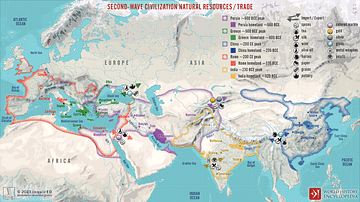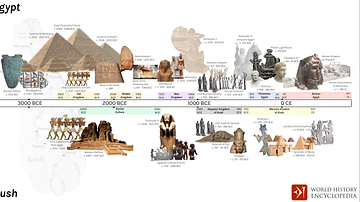Schools are closed in most countries and everyone has to adapt to a new reality of online learning. It is not easy for students, teachers and parents alike. Learning and teaching from home require a different approach.
Ancient History Encyclopedia is an organization that has been purely online for over ten years and many lessons from online working are transferrable to online education. On a more personal level, our family has been homeschooling for several years, too, and there are some tips that I would like to share with teachers and parents that I wish I had known when we started.

Stay in Touch
I think the key things in a time of transition are both communication and understanding. Everyone is feeling a bit lost right now; students and parents might not be sure what to do right now while teachers have to transition their curriculum to online (easier said than done). Meanwhile, everyone involved has to figure out the technical challenges this presents.
There are tools to help with this, and many schools are already using them. Among the teachers who use Ancient History Encyclopedia, Google Classroom is by far the most popular as it is easy to use and it is free. Teachers can set up classes, assign work to students, review the responses and give both individual and group feedback. Google has just released a tutorial series titled Teach from Home which gives video tutorials on how to use Google Classroom. We have also added a Send to Google Classroom button to each of our articles to make things easier.
Edmodo is also very popular and it also offers a guide for teaching from home. If your school is not using any of these, set up an account yourself. Or set up a Whatsapp or Facebook group with your students. Extraordinary times call for extraordinary measures.
While things are being sorted out, parents can really help their teachers by taking things into their own hands (as much as possible) and giving their children things to learn. Read on for some ideas below.
Use Online Resources
This is a bit obvious, but online resources are now more important than ever. The internet is full of excellent resources, and Ancient History Encyclopedia is one of them. Have a look at our education section where you can find free downloadable teaching materials (we are going to add many more resources and activities specifically aimed at online teaching in the coming weeks). We have also got a growing database of useful links for teaching history. Our articles are written for high school and (upper) middle school level, and for younger learners, you can find simpler versions of many of our articles on Newsela (you do need to sign up for a free account).
The Metropolitan Museum of Art's Heilbrunn Timeline of Art History is great for exploring the past (it is not just about art). The American Historical Association has many teaching materials for both American and World History. The Canadian Encyclopedia has lots of great learning material, not just for our Canadian readers. In the UK, the Historical Association has made some excellent learning material available online. For the history of philosophy, there is also the Internet Encyclopedia of Philosophy. Studying Rome? The American Institute for Roman Culture has a free online learning platform about Rome called Ancient Rome Live. Finally, you can find lots of interesting material on art and history on Google Arts & Culture.
There are also some great primary source collections, such as Fordham University's Internet History Sourcebooks, the National Archives, and Gutenberg.
For maths and sciences, Khan Academy has you covered; they even have daily schedules for kids learning from home. Literature? No problem: The British Library has many resources for teaching literature and history. Find thousands of free books on OpenLibrary.org. Audible is offering free children's audiobooks. For older high school kids now might be the time to take a first college-level class on Coursera or EdX!
If you are a member of your local library, check out their website; many libraries now offer e-books. Some museums offer free resources on their website. Don't just focus on your country - look at what is available globally!
Use Online Video
Parents have to work, too... don't feel bad giving the TV part of the teaching job! You can also find many excellent videos on Youtube, for all subjects and ages. Here are some great channels:
- Ancient History Encyclopedia of course!
- The Study of Antiquity and the Middle Ages
- History in Five
- TED-Ed
- Flash Point History
- CrashCourse
- Voices of Ancient Egypt
- The British Museum
- PBS Eons
- History Answers
- Smarthistory
- Historia Civilis
- Invicta
- Brave Wilderness, which is not at all about history, but very good!
If you are willing to pay, Netflix and Amazon both have many educational shows for children, as well as high-quality documentaries about most subjects. Then there is also Planet Knowledge and CuriosityStream filled with top-notch documentaries.
Don't Overdo It
This is particularly for parents who are now teaching their kids at home, but also for teachers giving assignments.
Parents, depending on how much support the school provides, parents may now be in charge of your children's learning. It is normal to feel pressure to instill as much learning into your child as possible, but do remember that one-to-one teaching is much more focused and efficient; the amount of time you have to invest is not fixed (not a full school day) but rather depends on your child. Let your child's abilities guide you; the benefit of one-on-one tuition is that you can adapt the progression speed to the learner.
Teachers, go easy on the parents. There is no need for material to fill a school day as kids are able to absorb so much more information in a one-on-one home situation without the distraction of schoolmates. Give your students and their parents some flexibility (within reason) to help them deal with the situation and maximize their learning outcomes.
In our family, each weekday we cover four subjects in sessions of 20 to 40 minutes each. We only do school in the mornings, which is great for both parents and children. Just like in school, we have got a schedule of which "class" happens at what time on which day. Some of these classes are online via Outschool (paid for). We can be flexible, of course, but this way the children get used to a schedule and the parents can plan their workday around it.
That is very successful for us with an elementary-school-aged child; older children might be able to do more and be more independent in their work (or not, we all know how teenagers can be). It really depends on your child. Ideally, find something your child is interested in and get them to explore the subject on their own as much as possible. There are some topics where my child does a much better job if we leave him to do it all alone, for example.
If there is resistance, try to find a way around it. You can use your children's interest as a frame; for example, if your child loves animals but hates math, you could frame your math problems around studying animal population growth over time. Younger children could do simple additions and subtractions of animals while older children could work with functions and curves to graph growth over time.
Other Skills
Finally, don't forget that purely academic subjects are not everything. This is a good time to work on other skills, too! While outdoor sports are probably not happening anymore, your children could do yoga at home (Cosmic Yoga for younger kids, Yoga with Adriene for older ones). You could also sign up for online classes with Outschool, which covers many subject areas including arts, storytelling, and Lego engineering.
We have heard of some homeschooled children getting a small amount of money from their parents to set up an online business. That could be anything, from buying & selling Pokemon cards on eBay to selling t-shirt designs on Threadless. Food for thought...
Note: You'll find most of the links in this article (and more) in our useful links section.







